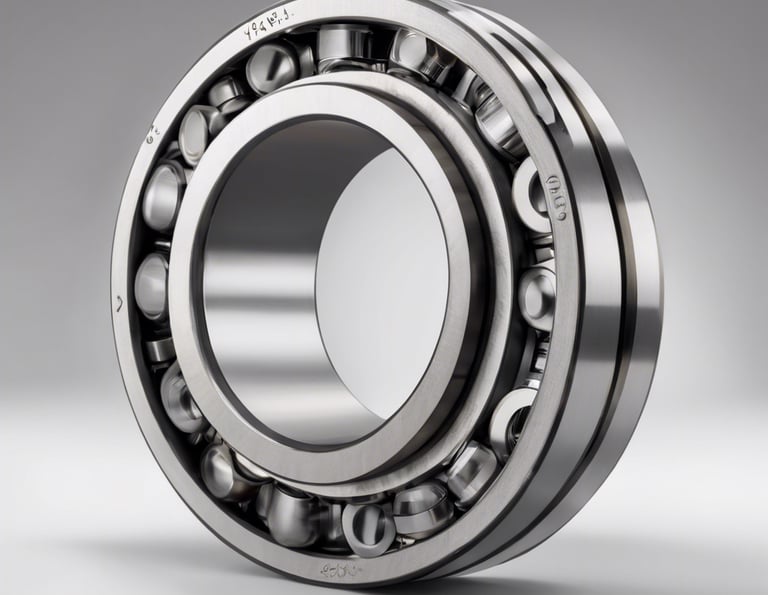Crusher Machine Bearings in Vapi, Valsad, Surat, Navsari, Silvassa, Pardi, and Daman
Crusher Bearing in Vapi
BEARING


Introduction to Crusher Machine Bearings
Crusher machine bearings play a pivotal role in ensuring the smooth operation and reliability of various types of crushers. These components are essential for supporting the heavy loads that crushers bear while facilitating rotation and reducing friction. The importance of high-quality bearings cannot be overstated, as they can significantly affect the overall performance and longevity of crushing machinery. In regions such as Vapi, Valsad, Surat, Navsari, Silvassa, Pardi, and Daman, the demand for reliable crushers in industries such as mining, construction, and recycling underscores the need for robust bearing solutions.
Among the different types of bearings used in crushers, spherical bearings are commonly preferred due to their ability to accommodate radial and axial loads, as well as misalignment. Models such as the 22320, 22322, 22324, and 22326 are notable choices that cater to various crushing applications. These bearings are designed to endure harsh operating conditions, providing the necessary support to the crusher’s rotor while simultaneously enhancing the efficiency of the machine. The robust design and superior performance of these bearings make them suitable for high-capacity operations often encountered in this sector.
In the aforementioned regions, there are several local manufacturers and specialized suppliers that cater to the demand for quality crusher machine bearings. These suppliers not only offer standard bearing models but also provide tailored solutions that meet specific industry needs. By choosing local suppliers, businesses can often benefit from shortened lead times and personalized service. Therefore, the selection of the right bearing is crucial, not just for optimal performance but also for maintaining the overall operational efficiency of crusher machines in the competitive landscape of Vapi, Valsad, Surat, Navsari, Silvassa, Pardi, and Daman.
Understanding Spherical Bearings: Models 22320 to 22326
Spherical bearings play a crucial role in the operation of crusher machines, especially in regions such as Vapi, Valsad, Surat, Navsari, Silvassa, Pardi, and Daman, where mining and crushing are prevalent. The models 22320, 22322, 22324, and 22326 possess unique technical specifications that enhance their functionality in challenging environments. Each model is designed to withstand high levels of radial and axial loads, making them ideal for applications in crushing machinery.
Model 22320 features an inner diameter of 100 mm and is capable of accommodating relatively larger loads due to its robust construction. The spherical design allows for angular misalignment, which is common in crushing operations. This model is especially beneficial in reducing wear and tear, thereby extending the lifespan of the bearing.
Moving on to model 22322, its inner diameter is 110 mm, which enables it to manage slightly higher loading capacities compared to the 22320. It also comes equipped with a higher dynamic load rating, making it highly efficient in operations that experience variable loads. The friction-resilient material used in its construction ensures smooth operation even under heavy stress.
Model 22324, with an inner diameter of 120 mm, is engineered for high-performance applications. This bearing is distinguished by enhanced sealing capabilities, providing superior protection against contaminants, which is vital in dusty environments typical in crushing sites. Its design ensures that lubrication is retained for extended periods, thus minimizing maintenance needs.
Lastly, the 22326 model is designed for extreme conditions with an inner diameter of 130 mm. This model stands out for its high resistance to extreme temperatures and its exceptional load-bearing capabilities, making it suitable for heavy-duty crusher machines. The choice between these models should be guided by specific operational needs, load requirements, and environmental conditions.
Maintenance and Best Practices for Crusher Bearings
Proper maintenance of crusher machine bearings is essential to ensure optimal performance and longevity. One of the most critical practices involves lubrication, which plays a significant role in minimizing friction and wear. It is advisable to use the manufacturer-recommended lubricant, paying close attention to its viscosity and other specifications. Regularly scheduled lubrication intervals should be adhered to, and technicians should monitor the condition of the lubricant for any signs of contamination or degradation.
Common signs of wear and tear can provide insight into the condition of the bearings. Notable signs include unusual noise during operation, vibrations, and excessive heat around the bearing area. Early detection of such symptoms can prevent catastrophic failures, making it crucial for operators to remain vigilant. Routine inspections should include checking for any irregularities or damage to the outer race, rolling elements, and inner race of the bearing.
In cases where maintenance does not resolve the issues, a replacement protocol should be firmly established. Standard procedures involve safely removing the damaged bearings, cleaning the housing thoroughly, and ensuring that all surfaces are free of contaminants before installing new components. Alignment during installation is also paramount; misalignment can lead to premature failure. Utilizing proper tools and techniques for alignment can greatly enhance the bearing's performance and lifespan.
For those in Vapi, Valsad, Surat, Navsari, Silvassa, Pardi, and Daman, local workshops and service providers offer specialized assistance for the crushing industry. These experts can provide essential maintenance services, including regular inspections and lubrication management, ensuring that the crusher machine bearings function at their best. By adhering to best practices for maintenance and consulting local professionals, operators can ensure the longevity and reliability of their crusher bearings.
Conclusion and Future Trends in Bearing Technology
Throughout this comprehensive guide on crusher machine bearings, we have highlighted the indispensable role that quality bearings play in enhancing the overall performance of crushing equipment. Properly functioning bearings not only ensure smoother operations but also contribute to the longevity of machinery in industries across Vapi, Valsad, Surat, Navsari, Silvassa, Pardi, and Daman. The effectiveness of these components has a direct influence on the efficiency of crushers, making it critical for operators to prioritize high-quality bearings that meet the operational demands of their equipment.
Looking towards the future, advancements in bearing technology are likely to continue evolving, addressing various challenges faced by industries reliant on crushers. A trend that is steadily gaining momentum is the integration of smart technology into bearing designs. This innovation allows for real-time monitoring of bearing conditions, which helps in predicting potential failures. By employing sensors and advanced analytics, operators can reduce downtime and optimize their maintenance schedules effectively.
Moreover, with a growing emphasis on environmental sustainability, many manufacturers are developing bearings that adhere to eco-friendly standards. These innovations aim to minimize waste and reduce energy consumption during operations. For regions like those mentioned, staying abreast of these developments will be vital in aligning with global sustainability goals and ensuring competitive advantages in the market.
In summary, the future of bearing technology in the context of crusher machines appears promising. As industries demand more efficiency and reliability, the evolution of bearings will play a critical part in fulfilling such requirements. For stakeholders in Vapi, Valsad, Surat, Navsari, Silvassa, Pardi, and Daman, adapting to these advancements will be essential in maintaining their operational performance and strategically positioning themselves within the market.
